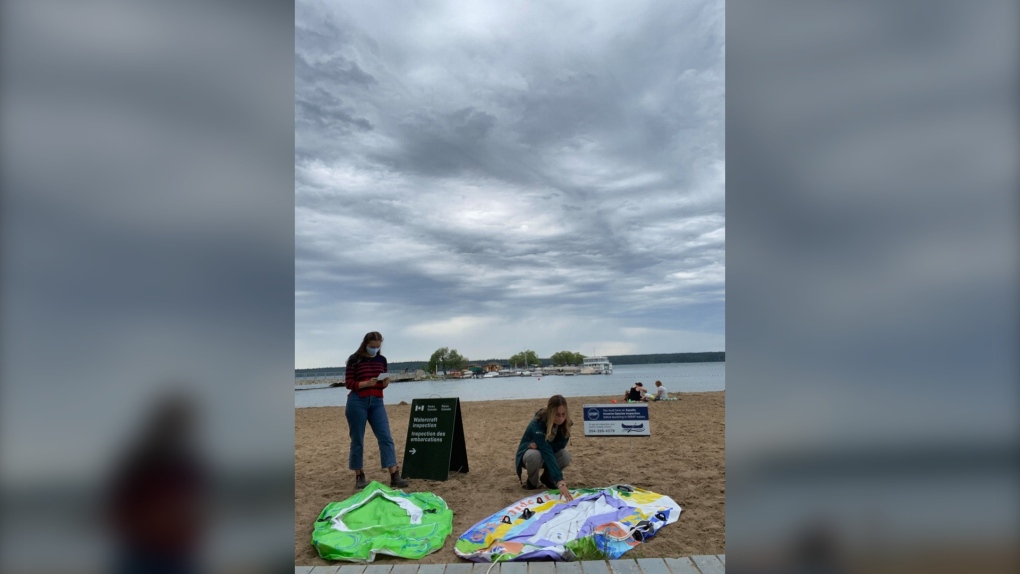Zebra mussels stopped from entering national park as they wreak havoc on Lake Winnipeg beach
 A photo of Parks Canada employees conducting inspections on inflatable rafts in Riding Mountain National Park. (Source: Facebook/Riding Mountain National Park)
A photo of Parks Canada employees conducting inspections on inflatable rafts in Riding Mountain National Park. (Source: Facebook/Riding Mountain National Park)
An inspection station in Riding Mountain National Park stopped zebra mussels from entering the water system, an important find since the invasive mollusk is wreaking havoc on Lake Winnipeg beaches.
According to a social media post from the park, staff found zebra mussels on a visitor's boat anchor.
"Thanks to the visitor's due diligence of getting their boat inspected by AIS Inspectors, the zebra mussels were apprehended and a full decontamination was completed upon inspection," read the post.
Parks Canada said it is vital all watercraft, including inflatable and toys, be inspected and decontaminated before entering any body of water in the park.
Riding Mountain National Park said it has noticed an increase in visitors avoiding the inspection/decontamination and launching in lesser-used park waters.
"Refusing to get your watercraft inspected/decontaminated can have extremely harmful ecological effects on all park waters and can deem the water unusable for wildlife and recreational use," also read the park's post.
The harmful effects of zebra mussels can be found on Hillside Beach, which is located on the eastern shore of Lake Winnipeg.
The Hillside Community Association said shells covering the beaches have been a problem for several years.
"Our community association has been advocating for a sustainable collaboration between the Provincial government, our Rural Municipality and other East beach communities," said Lynnette Froese, current president of the association, in a statement to CTV News.
"We face challenges with permits for removal and disposal delayed and the need for methods that are funded and supported by more than the small associations and volunteers."
The association said it does receive some money from the RM of Alexander for the transport and disposal of shells.
According to Froese, annual clean-up effort have been halted due to pandemic concerns, leaving the beach covered in shells.
Until a sustainable solution is found for shell removal, it is up to many hands to make light work, the association said.
CTVNews.ca Top Stories

Possible scenarios that could play out in Ottawa as the Liberal government teeters
Prime Minister Justin Trudeau is said to be reflecting on his future over the holidays after the resignation of his top cabinet minister, Chrystia Freeland, in mid-December. The bombshell move prompted a fresh wave of calls for Trudeau to step down as Liberal leader from inside and outside the caucus.
5 things we know and still don't know about COVID, 5 years after it appeared
The virus is still with us, though humanity has built up immunity through vaccinations and infections. It's less deadly than it was in the pandemic's early days and it no longer tops the list of leading causes of death. But the virus is evolving, meaning scientists must track it closely.
The man who died in a Las Vegas Cybertruck was shot in head before explosion, sheriff says
The person inside the Tesla Cybertruck blown up outside U.S. President-elect Donald Trump's Las Vegas hotel suffered a gunshot to the head before the explosion, Clark County Sheriff Kevin McMahill said Thursday. McMahill said a handgun was found at his feet.
Woman, father killed on New Year's Eve were victims of intimate partner violence: Halifax police
Halifax police are investigating three deaths that are connected – two of which they say were homicides resulting from intimate partner violence – in the city on New Year’s Eve.
Mounties investigate discovery of 'very small pipe bomb' in Kamloops, B.C.
Mounties are investigating and appealing for witnesses after an explosive device was discovered Wednesday on a beach in Kamloops, B.C.
LIVE UPDATES FBI says the New Orleans truck attacker acted alone in an 'act of terrorism'
The FBI now says the New Orleans truck attacker acted alone in an 'act of terrorism' when he drove a pickup truck into a crowd of New Year's revellers early Wednesday, killing 14 people.
Sask. RCMP locate missing inmate of Yorkton prison
An inmate who was wanted for being unlawfully-at-large after not returning to Whitespruce Provincial Training Centre in Yorkton has been found and arrested.
FORECAST Weather warnings issued in 7 provinces and territories
Wintry weather conditions, including heavy snow and wind chill values around -55, prompted warnings in seven provinces and territories Thursday.
Who are Canada's top-earning CEOs and how much do they make?
Canada's 100 highest-paid CEOs earned $13.2 million on average in 2023 from salaries, bonuses and other compensation, according to the Canadian Centre for Policy Alternatives.


































